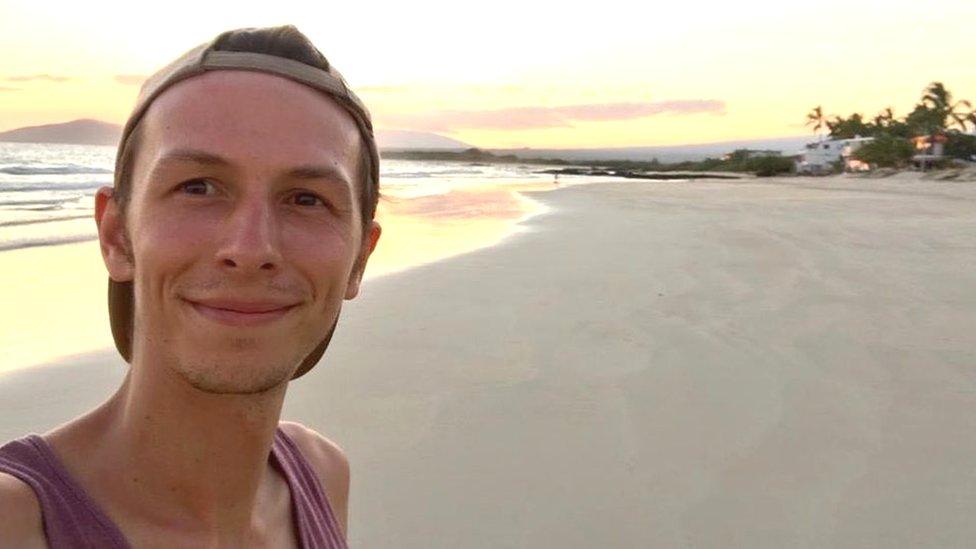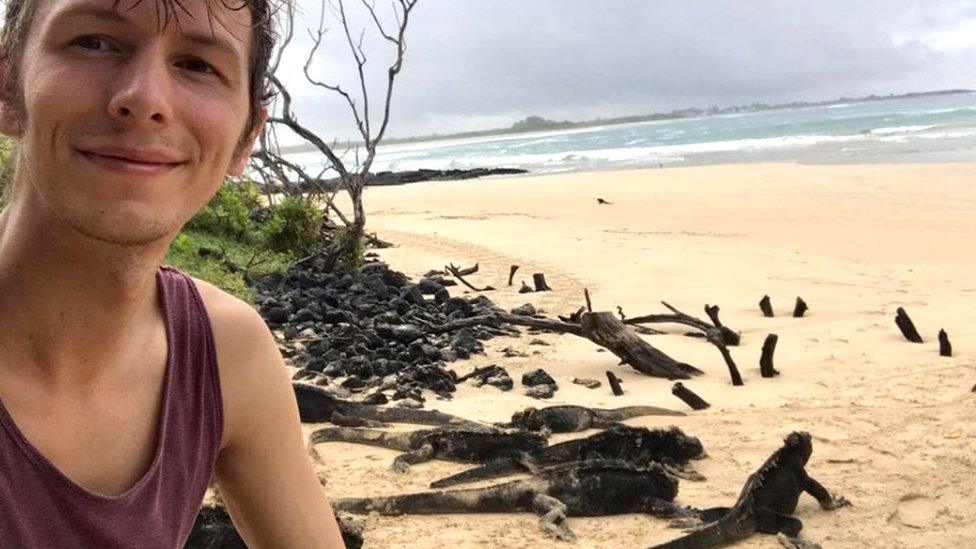Coronavirus: 'Galapagos wildlife getting me through lockdown'
- Published

Ian Melvin arrived in the Galapagos Islands in the middle of March
A Scot has told how the "incredible" wildlife of the Galapagos Islands is helping him get through coronavirus lockdown thousands of miles from home.
Ian Melvin, of Banchory in Aberdeenshire, has been unable to leave the islands - off Ecuador in the Pacific Ocean.
The 29-year-old teacher was travelling in South America when the pandemic hit.
However, he said he had been made to feel part of the island community since the middle of March.
Seeing giant Tortoises, penguins, iguanas, sea lions and flamingos have been among the highlights of his stay.
Mr Melvin said: "I'm recognised as the Scottish tourist that has decided to stay with them on the island."
He was living in China from 2016 to 2019 - one year teaching English and two years teaching chemistry - then came back to Scotland in August 2019, before taking a year off work to head to South America in November.
His journey of the continents started in Argentina, followed by Chile, Uruguay, Bolivia and Peru, before he arrived in the Galapagos Islands on 14 March.
'Beautiful island'
He took the ferry to Isabela Island on 17 March, but this was the last ferry before they locked down.
"I came to the Galapagos Islands because it was my dream to scuba dive with hammerhead sharks, and luckily when I first arrived I was able to do that for the first two days, which was incredible," he said.
"But then they started shutting down all the tour companies, so I decided to take a ferry to a quieter island, which is more relaxed and has lots of wildlife.
"However after I arrived, locals told me that the island was being closed for two weeks and nobody was allowed to enter or leave during that period.
"I just decided to stay because I really love it here and the family I'm staying with were happy for me to stay as long as I needed. I decided the best option was to wait it out and spend time on such a beautiful island."

He explained: "Every day that I have here, I just try to make the most of the nature and scenery that surrounds me.
"I go for a run along the beach at sunrise and after that I usually go for a swim in the ocean to cool off. I have to go back indoors at 2pm because we have a curfew.
"Even on the Galapagos Islands there have been quite a few coronavirus cases, so the lockdown has been quite strict.
"Nearly everything is closed apart from a few shops where you can buy food and even then you can't go inside - you have to order from a window, which for me has been quite difficult because I've got to explain in Spanish what I would like."

A SIMPLE GUIDE: How do I protect myself?
AVOIDING CONTACT: The rules on self-isolation and exercise
LOOK-UP TOOL: Check cases in your area
MAPS AND CHARTS: Visual guide to the outbreak

Mr Melvin said he had been "really lucky" with the host family he spent six weeks with.
"They have a house on the beach. I spent my birthday with them and they baked me a cake which was so nice of them.
"They have since helped me to find an apartment of my own. I really feel like part of the island now and part of the community.
"The locals are all really friendly. It's a small island so everyone knows everyone.
"They are always happy to talk to me and recommend things for me to do to enjoy the island, so I've been really happy here."
He said he missed his parents, friends and family.
"The highlight for me living on this island has definitely been the wildlife - it's just incredible."
"In terms of what I'm going to do next, I don't really know. There's so much uncertainty over whether I'll be able to continue to travel or if I'll have to return to Scotland. I'm just going to make the most of this experience while it lasts."


Use the form below to send us your questions and we could be in touch.
In some cases your question will be published, displaying your name, age and location as you provide it, unless you state otherwise. Your contact details will never be published. Please ensure you have read the terms and conditions.
If you are reading this page on the BBC News app, you will need to visit the mobile version of the BBC website to submit your question on this topic.